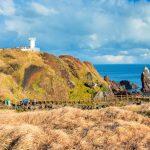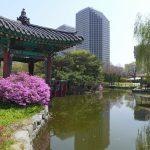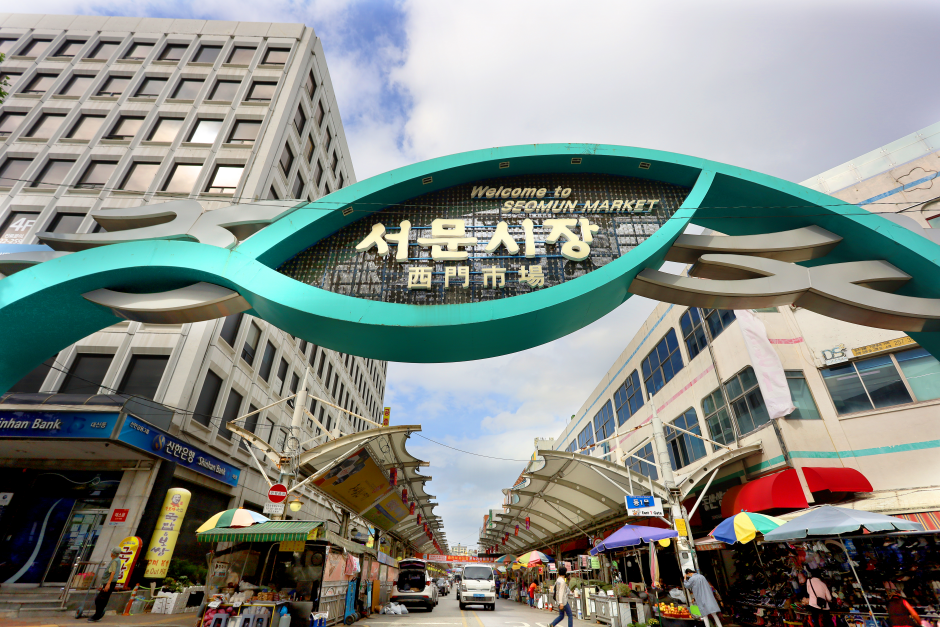Located on the southeastern coast of South Korea, Busan is a dynamic and picturesque city known for its stunning beaches, bustling markets, and rich cultural heritage. With a population of over 3 million people, Busan is the second-largest city in South Korea and a popular destination for both domestic and international travelers. From its tranquil temples and traditional neighborhoods to its modern skyscrapers and vibrant nightlife, Busan offers a diverse range of experiences for visitors seeking a mix of relaxation, adventure, and cultural exploration
History & Culture: Busan has a fascinating history that stretches back thousands of years. As a major port city, it has long served as a gateway for international trade and cultural exchange. Throughout its history, Busan has endured invasions and wars, shaping its unique identity. The city boasts several historical landmarks, including the ancient Beomeosa Temple, which dates back to the 7th century, and the historic Gamcheon Culture Village, known for its colorful houses and steep alleyways. Busan’s culture is deeply rooted in its maritime heritage, with a strong emphasis on fishing, seafood cuisine, and traditional performances such as the Busan International Film Festival.
Weather and Best Time to Visit: Busan has a mild and temperate climate, characterized by hot summers and cool winters. The best time to visit Busan is during spring (April to June) and autumn (September to November) when the weather is pleasant, and the city is adorned with beautiful cherry blossoms or vibrant fall foliage. Summer (July to August) is popular for beach activities, but it can be hot and humid. Winter (December to February) is chilly, but it offers a unique experience with fewer crowds and festive events like the Busan Christmas Tree Festival.
How to Reach: Busan is well-connected to other major cities in South Korea and has excellent transportation infrastructure. The city is served by Gimhae International Airport, which offers domestic and international flights. From the airport, travelers can easily reach the city center by express train, airport limousine buses, or taxis. Additionally, Busan is well-connected by train and bus networks, making it convenient to travel to and from other parts of the country.
Local Transportation Available: Busan has an efficient public transportation system that makes it easy to explore the city. The Busan Metro, consisting of five lines, is a convenient way to travel around the city and reach major attractions. Buses are also widely available and offer extensive coverage, including routes to more remote areas. Taxis are plentiful and reasonably priced, providing a comfortable option for getting around. Additionally, rental cars and bicycles are available for those who prefer more flexibility and independence in their travels.
Must-Visit Tourist Attractions:
- Haeundae Beach: Busan’s most famous and popular beach, known for its pristine sands and vibrant atmosphere.
- Gamcheon Culture Village: A picturesque village with colorful houses, art installations, and narrow alleyways.
- Beomeosa Temple: A historic Buddhist temple Located in the mountains, offering serenity and beautiful architecture.
- Jagalchi Fish Market: One of Korea’s largest seafood markets, where visitors can experience the bustling atmosphere and sample fresh seafood dishes.
- Gwangalli Beach: Another stunning beach with a lively ambiance, offering breathtaking views of the Gwangan Bridge.
- Haedong Yonggungsa Temple: A unique seaside temple known for its beautiful oceanfront setting and stunning views.
- Taejongdae Park: A scenic coastal park with cliffs, dense forests, and panoramic views of the sea.
- Busan Tower: An iconic landmark offering panoramic views of the city and its surroundings.
- Yongdusan Park: A central park in Busan with lush greenery, historical monuments, and an observatory.
- Busan Museum: A comprehensive museum showcasing Busan’s history, art, and cultural heritage.
Must-Do Activities:
- Visit the bustling Gukje Market and explore its narrow alleyways filled with shops and street food vendors.
- Enjoy a traditional Korean spa experience at one of Busan’s jjimjilbangs.
- Take a cruise or ferry ride around the harbor to appreciate Busan’s coastal beauty.
- Explore the vibrant nightlife scene in the lively districts of Seomyeon and Gwangbok-ro.
- Attend a performance at the Busan Cultural Center or the Busan Cinema Center during the Busan International Film Festival.
- Embark on a hiking adventure at Geumjeongsan Mountain and discover its ancient fortress.
- Indulge in mouthwatering seafood dishes at one of Busan’s many seafood restaurants.
- Explore the vibrant street art scene in the trendy neighborhoods of Seomyeon and Nampo-dong.
- Discover the charm of Busan’s traditional markets, such as Jagalchi Market and Gukje Market, and try local street food.
- Relax and rejuvenate at one of Busan’s many hot springs and wellness centers.
Fun & Entertainment Parks:
- Shinsegae Centum City: One of the world’s largest department stores, offering luxury shopping, entertainment, and a rooftop park.
- Busan Children’s Grand Park: A family-friendly park with various rides, playgrounds, and animal exhibits.
- Songdo Skywalk: A glass-bottomed walkway that stretches out over the ocean, offering breathtaking views.
Popular Food and Drinks:
- Milmyeon: Busan’s signature dish, consisting of cold noodles served in a spicy and tangy broth.
- Dwaeji Gukbap: A hearty pork soup with rice, often enjoyed with kimchi and side dishes.
- Ssiat Hotteok: A sweet pancake filled with a mixture of seeds, nuts, and honey.
- Dongnae Pajeon: A savory pancake made with green onions, seafood, and various ingredients.
- Eomuk: Fish cakes on skewers served in a warm and flavorful broth.
- Makchang: Grilled pork intestines, a popular street food delicacy in Busan.
- Dongnae Yakgwa: Traditional Korean cookies made from wheat flour and honey.
- Dongnae Halmae Pajeon: A famous seafood pancake made by the grandmother (halmae) in Dongnae, known for its delicious flavor.
Restaurants and Bars:
- Gwangbok-ro Street: A bustling street lined with restaurants, cafes, and bars offering a variety of cuisines.
- Seomyeon Food Alley: A popular area in Busan known for its wide range of dining options, from traditional Korean to international cuisines.
- Haeundae Food Street: Located near Haeundae Beach, this vibrant street offers an array of seafood restaurants and local specialties.
- Gwangalli Beach: The surrounding area is dotted with numerous restaurants and bars, offering beautiful views of the beach and the Gwangan Bridge.

Nightlife and Nightclubs: Busan’s nightlife scene is diverse and energetic. Haeundae and Gwangalli Beach are popular spots for beachside bars and clubs, where visitors can enjoy live music, dancing, and cocktails. Seomyeon and Gwangbok-ro are known for their vibrant street nightlife, with numerous bars, pubs, and clubs offering a variety of entertainment options.
Shopping Centers and Markets:
- Shinsegae Centum City: A massive shopping complex with luxury boutiques, department stores, and entertainment facilities.
- Lotte Department Store: A well-known department store chain offering a wide range of fashion, beauty, and lifestyle products.
- Nampo-dong Street Market: A bustling market area with shops selling clothing, accessories, cosmetics, and street food.
- Gukje Market: A traditional market where visitors can find a variety of goods, including clothing, electronics, and local snacks.
- Seomyeon Underground Shopping Center: An underground shopping mall with numerous shops selling fashion items, cosmetics, and accessories.
Museums and Educational Institutions:
- Busan Museum: A comprehensive museum showcasing Busan’s history, art, and cultural heritage.
- National Maritime Museum: A museum dedicated to the maritime history and culture of Korea.
- Busan National University: One of Busan’s prominent educational institutions, known for its academic excellence.
Safety for Tourists and Do’s & Don’ts: Busan, like the rest of South Korea, is considered a safe destination for tourists. However, it’s always important to take general precautions, such as being mindful of your belongings, using trusted transportation services, and being aware of your surroundings. As a sign of respect, it is advisable to learn a few basic Korean phrases and observe local customs and etiquette, such as bowing when greeting and removing shoes when entering someone’s home.
Environment and Sustainable Tourism: Busan is committed to sustainable tourism and environmental conservation. The city promotes eco-friendly practices, such as waste management and recycling programs. Visitors are encouraged to use public transportation, minimize plastic waste, and explore nature responsibly by following designated trails and respecting wildlife.
General Information:
- Language: The official language is Korean, but English is commonly spoken in tourist areas.
- Religion: The majority of the population practices Buddhism or Christianity.
- Population: As of September 2021, Busan’s population is approximately 3.4 million.
- Holidays: Major holidays in South Korea include Lunar New Year, Chuseok (harvest festival), and Korean Independence Day.
- Water: Tap water is generally safe to drink in Busan.
- Electricity: The standard voltage is 220V, and the outlets typically accommodate two round pins.
- Mobile and Internet: Busan has excellent mobile coverage and high-speed internet connectivity.
- Health Services: Busan has modern medical facilities and hospitals that provide quality healthcare services.
- Postal Service: The Korea Post offers reliable postal services in Busan.
- Suitable Clothing: The appropriate clothing depends on the season. Light and breathable clothing is suitable for summers, while warmer clothing is recommended for winter.
- Banks: Busan has a wide network of banks and ATMs that accept international cards.
Conclusion || Busan
In conclusion, Busan captures the hearts of travelers with its beautiful beaches, historical sites, delicious cuisine, and vibrant cultural scene. Whether you’re seeking relaxation on the sandy shores, exploring ancient temples, or indulging in mouthwatering seafood, Busan offers a wealth of experiences for every visitor. With its rich history, warm hospitality, and commitment to sustainable tourism, Busan is an enticing destination that should not be missed when exploring South Korea.
Book Your Flights : Here 30% OFF on Booking
Book Your Hotels : Here 20% OFF on Booking




























0 Comment